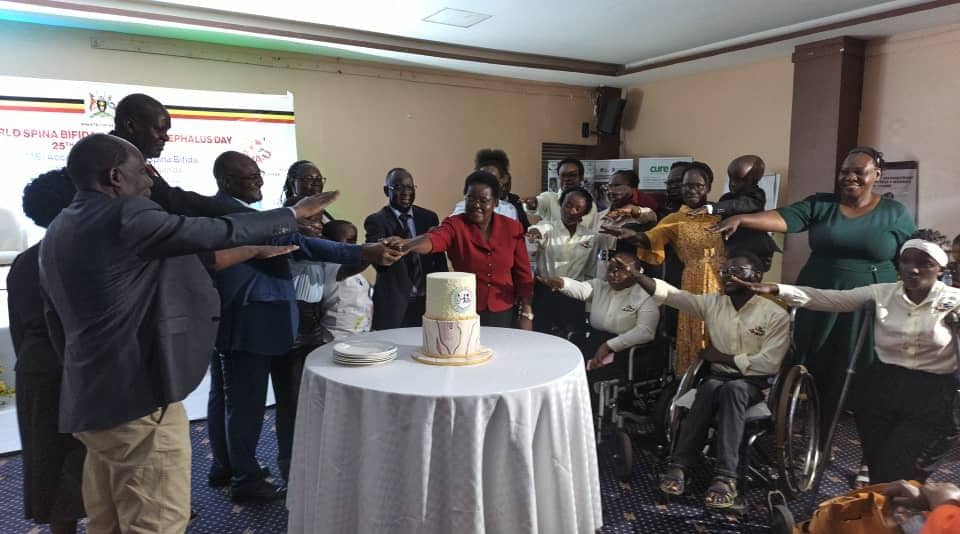Uganda joined the rest of the world on Thursday to commemorate World Spina Bifida and Hydrocephalus Day, with a call to strengthen rehabilitation services and improve access to essential drugs for people living with the two lifelong conditions.
The event was held at Silver Springs Hotel, Bugolobi, under the theme “Accelerating Action for Spina Bifida and Hydrocephalus in Uganda.”
Speaking at the event, Dr George Upentytho, Commissioner for Health Services and Community Health at the Ministry of Health, said the government is prioritising rehabilitation and long-term support for people living with disabilities, including those affected by spina bifida and hydrocephalus.
“On this particular day, we join the rest of the world to commemorate that day for spinal bifida and hydrocephalus. And as ministry rehabilitation of these conditions, the care and treatment are at the centre,” he said.
Dr Upentytho noted that while treatment can help manage the conditions, they are not curable, which makes rehabilitation essential.
“Knowing very well that hydrocephalus and spinal bifida are lifelong conditions. Even when treatment is given, we don't cure them corporately. They would need rehabilitation, and that's why there's a whole division of disability rehabilitation in the Ministry of Health,” he added.
He revealed that the ministry has developed a new Rehabilitation and Assistive Technology Strategic Plan (2025–2031) aimed at prevention, care, and rehabilitation for people living with disabilities.
“In that strategy, there are comprehensive measures that address prevention, care, and treatment of these conditions at various levels. But at the centre of all this, it is prevention. That is the preferred mode,” he said.
Dr Upentytho explained that the strategy also includes plans for the procurement of assistive devices such as wheelchairs, crutches, and hearing aids.
Currently, public facilities offering treatment for spina bifida and hydrocephalus include Mulago and Mbarara hospitals, while private institutions such as Cure also provide specialised care.
However, he acknowledged that access to some vital drugs remains a challenge, as only about 20 neurosurgeons serve the entire country.
The Spina Bifida and Hydrocephalus Association of Uganda (SHAU) board chairperson Phoebe Muntonyi urged the government to prioritise food fortification and ensure access to essential drugs for children living with spina bifida and hydrocephalus.
She said the burden of the two conditions remains high, with at least one in every 10,000 children born with spina bifida or hydrocephalus. She called for stronger action to prevent new cases through improved nutrition.
“We want to call upon the entire country to know that this condition can be prevented. And because it can be prevented, we want to look into the fortification of foods… the reason why we are having more cases of spina bifida and hydrocephalus is the food we eat because it does not have enough folic acid,” she said.
Mutonyi also appealed to the government to make oxybutynin, a drug used by children with spina bifida, part of Uganda’s essential medicines list.
“We believe the government needs to take this as an essential drug because we are depending on donors. Supposing tomorrow donors withdraw—what happens to our children?” she asked, adding that the Ministry of Health has already begun taking steps to address the issue, though progress is gradual.
Dr Olive Nabiryo, an occupational therapist at Katalemwa Cheshire Home, said the organisation has been rehabilitating children with disabilities since 1970.
“We are over 50 years and above rehabilitating children with disabilities. And among these children are those with spina bifida and hydrocephalus,” she said.
Katalemwa provides services such as physiotherapy, occupational therapy, and fabrication of assistive devices, including wheelchairs, crutches, and splints.
The organisation also conducts outreach clinics in areas such as Mubende, Hoima, and Kiboga to reach children who cannot travel to Kampala.
Dr Nabiryo said the centre supports more than 6,000 children with spina bifida and hydrocephalus in the central region alone but can only reach about 1,000 each year due to limited staff and resources.
She highlighted a major challenge: the unavailability of oxybutynin, a drug crucial for managing bladder problems in children with spina bifida.
“This oxybutynin is not among the essential drugs in Uganda. Meaning, sometimes we are unable to have it… If the child has been going to school and has been using oxybutynin, we'll put on hold everything because they can't continue when they are dribbling,” she said, warning that lack of the drug can lead to kidney damage.
*Rising Cases at Cure Children’s Hospital*
At Cure Children’s Hospital in Mbale, which specialises in paediatric neurosurgery, the numbers of cases continue to rise.
Tonny Wambi, a nurse at the hospital, said between January and September this year alone, 217 spina bifida surgeries and 1,200 hydrocephalus surgeries were conducted.
“The situation is that bad if I've used those current numbers. And we see that the trend is going up,” he said.
Wambi called for greater awareness and government investment in specialised care.
“Awareness should be increased because people don't know about these conditions. Government should train more neurosurgeons… They can also increase on how they are supporting hospitals that attend to children with spina bifida and hydrocephalus,” he said.
He also echoed calls for oxybutynin to be included on the list of essential drugs.
“Children living with effects of spina bifida, their urinary bladders keep contracting, so it means they will be incontinent. To reduce that, they need to use that drug to relax the bladder. So we are requesting that if it could be added on the essential drugs, then people living with effects of spina bifida will live a better life,” Wambi explained.
Cure Children’s Hospital, a private not-for-profit institution, works with the Ministry of Health and partners such as the Joint Medical Store to import the drug.
As Uganda marked this year’s commemoration, health experts and advocates urged the government to prioritise rehabilitation services, increase training for specialists, and ensure essential drugs like oxybutynin are accessible to all those in need.


